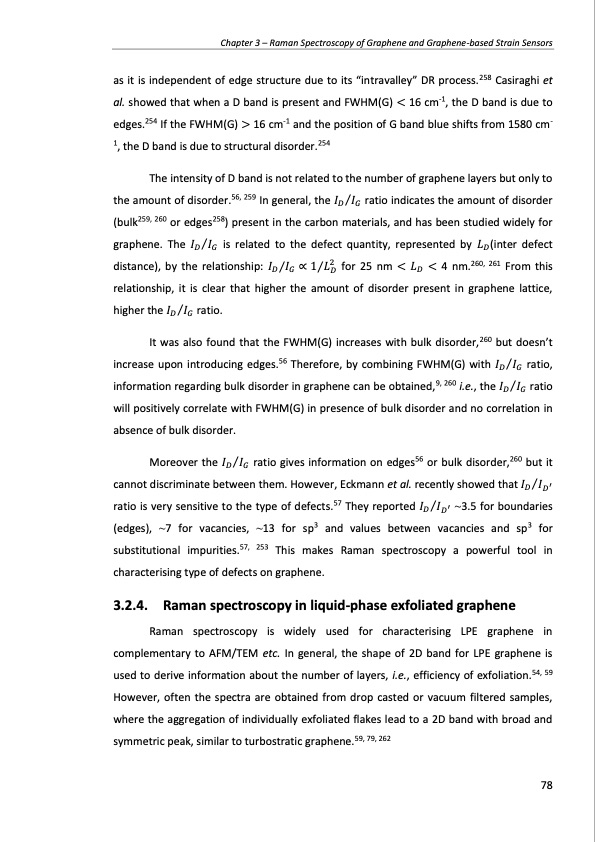
PDF Publication Title:
Text from PDF Page: 078
Chapter 3 – Raman Spectroscopy of Graphene and Graphene-based Strain Sensors as it is independent of edge structure due to its “intravalley” DR process.258 Casiraghi et al. showed that when a D band is present and FWHM(G) < 16 cm-1, the D band is due to edges.254 If the FWHM(G) > 16 cm-1 and the position of G band blue shifts from 1580 cm- 1, the D band is due to structural disorder.254 The intensity of D band is not related to the number of graphene layers but only to the amount of disorder.56, 259 In general, the 𝐼𝐷⁄𝐼𝐺 ratio indicates the amount of disorder (bulk259, 260 or edges258) present in the carbon materials, and has been studied widely for graphene. The 𝐼𝐷⁄𝐼𝐺 is related to the defect quantity, represented by 𝐿𝐷(inter defect 2 260, 261 distance), by the relationship: 𝐼𝐷⁄𝐼𝐺 ∝ 1⁄𝐿𝐷 for 25 nm < 𝐿𝐷 < 4 nm. From this relationship, it is clear that higher the amount of disorder present in graphene lattice, higher the 𝐼𝐷⁄𝐼𝐺 ratio. It was also found that the FWHM(G) increases with bulk disorder,260 but doesn’t increase upon introducing edges.56 Therefore, by combining FWHM(G) with 𝐼𝐷⁄𝐼𝐺 ratio, information regarding bulk disorder in graphene can be obtained,9, 260 i.e., the 𝐼𝐷⁄𝐼𝐺 ratio will positively correlate with FWHM(G) in presence of bulk disorder and no correlation in absence of bulk disorder. Moreover the 𝐼𝐷⁄𝐼𝐺 ratio gives information on edges56 or bulk disorder,260 but it cannot discriminate between them. However, Eckmann et al. recently showed that 𝐼𝐷⁄𝐼𝐷′ ratio is very sensitive to the type of defects.57 They reported 𝐼𝐷⁄𝐼𝐷′ ~3.5 for boundaries (edges), ~7 for vacancies, ~13 for sp3 and values between vacancies and sp3 for substitutional impurities.57, 253 This makes Raman spectroscopy a powerful tool in characterising type of defects on graphene. 3.2.4. Raman spectroscopy in liquid-phase exfoliated graphene Raman spectroscopy is widely used for characterising LPE graphene in complementary to AFM/TEM etc. In general, the shape of 2D band for LPE graphene is used to derive information about the number of layers, i.e., efficiency of exfoliation.54, 59 However, often the spectra are obtained from drop casted or vacuum filtered samples, where the aggregation of individually exfoliated flakes lead to a 2D band with broad and symmetric peak, similar to turbostratic graphene.59, 79, 262 78PDF Image | PRODUCTION AND APPLICATIONS OF GRAPHENE AND ITS COMPOSITES

PDF Search Title:
PRODUCTION AND APPLICATIONS OF GRAPHENE AND ITS COMPOSITESOriginal File Name Searched:
graphene-production-applications.PDFDIY PDF Search: Google It | Yahoo | Bing
Salgenx Redox Flow Battery Technology: Power up your energy storage game with Salgenx Salt Water Battery. With its advanced technology, the flow battery provides reliable, scalable, and sustainable energy storage for utility-scale projects. Upgrade to a Salgenx flow battery today and take control of your energy future.
| CONTACT TEL: 608-238-6001 Email: greg@infinityturbine.com | RSS | AMP |